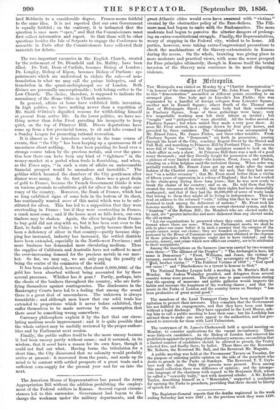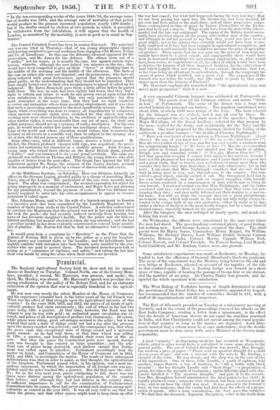4t Tiirtrufulte.
THE Metropolis was visited on Monday by a "Chartist demonstration" " in honour of the champion of Chartism " Mr. John Frost. The parties to this " demonstration" assembled at different points according to an arranged plan. One body met in _Lincoln's Inn Fields ; this was augmented by a handful of foreign refugees from Leicester Square; another met in Russell Square ; others South of the Thames and East of Bishopsgate Street ; the main body had their rendezvous in Finsbury Square. Nose of these gatherings were large; very few respectable working men left their labour as invited ; but "roughs" and "pickpockets" were plentiful. All the bodies moved on Finsbury Square ; but when united they made a very poor show. At noon Mr. Frost arrived, in a carriage drawn by four gray horses, and preceded by three outriders. The "champion" was accompanied by Mr. Ernest Jones, Mr. James Finlen, and three other notables. From Finsbury Square the "Democrats" set forth in procession; passing through the heart of the Ci , reaching Regent Street by the Strand and Pall Mall, and marching to • Hill by Portland Place. The streets were full of the "curious" ; but the spectators seemed to look on the whole affair as only a show. At Primrose Hill there was a mob of a good many thousands ; and they literally fought for possession of the summit, a plateau of very limited extent—the leaders, Frost, Jones, and Finlen, standing on a form helpless amid the turbulent throng. When order was partially restored, Mr. Ernest Jones got up and spoke after the usual fashion of the Chartist orator. He told the mob, that they had never met "on a nobler occasion" ; that Mr. Frost stood before them a victim of fifteen years of oppression in a colony of England ; that he had worked in the chain-gang during those long years ; that he was now ready to break the chains of his country; and so on. He told them that they created the resources of the world; that their rights had been shamefully confiscated; and that if they had the 30,000,000 of acres of waste lands that belong to them they might all be living in independence. Then he read an address to the returned "exile," telling him that he was "fit and destined to rank among the deliverers of nations." Mr. Frost took his honours meekly. He discoursed on our corrupt electoral system, and the "humbug" of the Reform Bill; the Members who are elected under it he said, are "greater imbeciles and more dishonest than any elected under the old system."
"Let our organizations be preserved where they exist, and let others be formed where there are none. When the Parliament meets, we shall be able to place our cause before it in such a manner that the enemies of the people cannot resist our claims; they are founded on justice. The powers possessed by the House of Commons are usurpations obtained at the expense of those principles which deputies ought not to have violated; and the poverty, misery, and crime which now afflict our country, are to be attributed to these usurpations." Among the inscriptions on the banners (one was carried by two women) were these—" The alliance of the Peoples" ; " The Archangel is here his name is Democracy" ; "Frost, Williams, and Jones, the victims of tyranny, restored to their homes" ; " The sovereignty of the People" ; Vail, brother victim !" " The Political Victims of 1848" ; " God speed our cause !" and " Disobedience to a tyrant is honour to God."
The National Sunday League held a meeting in St. Martin's Hall on Monday. Sir Joshua Walmsley presided, and delegates from several country towns were present. The object was to pass resolutions stating that the opening of museums and public galleries would improve the habits and increase the happiness of the working classes ; and that the music in the Parks of London and the country towns on Sundays " has been productive of great moral good."
The members of the Land Transport Corps have been engaged in an agitation to protect their interests. They complain that the Government has not fulfilled its engagements, and that they have been sent home without a legal discharge. They have appealed to the Lord Mayor, ask- ing him to call a public meeting to hear their case; but his Lordship has advised them to make one more appeal to the authorities, and has pro- mised to intercede for them with Lord Palmerston.
The vestrymen of St. James's Clerkenwell held a special meeting on Monday, to consider applications for the vacant incumbency. There were forty-six candidates. As the Bishop of London had removed his prohibition against the preaching of probationary sermons, on condition that a limited number of candidates should be allowed to preach, the Vestry selected five, and finally three, by ballot. These three are the Reverend Mr. Roberts, the Reverend Mr. Ball, and the Reverend Mr. Maguire.
A public meeting was held at the Freemasons' Tavern on'Tuesday, for the purpose of enlisting public opinion on the side of the preachers who desire to preach, in the Parks on Sundays. The Reverend T. T. Cryb- bace took the chair. Only fifty persons were present. Even among this small collection there was difference of opinion; and the intempe- rate language of the chairman with regard to Sir Benjamin Hall, whom he called a "cowardly bully," met with deserved rebuke. A Mr. Robert Taylor, describing himself as a "Materialist," supported a resolution for opening the Parks to preachers, providing that there should be liberty of speech for all.
The Registrar-General reports that the deaths registered in the week ending Saturday last were 1087 ; in the previous week they were 1100. " In the ten corresponding weeks of the years 1846-'55, the average num- ber of deaths was 1355, and the average rate of mortality of that period would produce in the present increased population nearly 1500 deaths ; but if the deaths caused by cholera at two periods in which it prevailed be withdrawn from the calculation, it will appear that the health of London, as measnred by the mortality, is now as good as is usual in Sep- tember."
The Central Criminal Court has been in session this week. The principal case was one tried on Thursday—that of ten young shipwrights charged vith having conspired to prevent workmen from engaging with Messrs. Young and Co. of Limehouse. In this case the Attorney-General appeared for the prosecution, and Mr. James for the defence. The offence arose out of a " strike," not for wages, as is usually the case, but against certain regu- lations, whereby, although the men gained ten minutes on the day, they would have been compelled to give up their " haver" or drinking-time in the middle of the morning and the middle of the afternoon. The facts of the case on either side were not disputed ; and theprosecutors, who have all along behaved with great forbearance, agreed that the prisoners should plead guilty, on the understanding that they should not be punished. They were simply bound over in their own recognizances to appear if called up for judgment. Mr. Baron Bramwell gave them a little advice before he parted with them. The law, he said, had been rightly laid down, that they had a right to refrain and refuse to work for any person except upon terms that were satisfactory to themselves. This was only reasonable ; but they must remember at the same time, that they had no right whatever to coerce and intimidate others from accepting employment, and it was clear that such a proceeding amounted to the most insufferable tyranny. In these times, when everything was done to remove all impediments to commerce, when ancient corporate rights were abolished for that object, and when working men were allowed facilities, by the abolition of apprenticeship and other similar rights, it was intolerable that any set of men, for their own selfish purposes, should set up a tyranny of such a description. For his own part, he would much rather live under one intelligent despot, whose know- ledge of the world and whose education would induce hun to exercise his -tyranny at all events in a sensible way, than be subject to the tyranny of a set of men who did not possess any of those qualifications. Some other cases, tried at different times, deserve a brief record. M. Michel, the French professor charged with rape, was acquitted ; the prose- cutrix not sustaining her character as a credible person. John Cooper, a young man who forged three checks on the Royal British Bank, pleaded Guilty," and was sentenced to six years' penal servitude. The same pu- nishment was inflicted on Thomas and Hillyer' the young fellows who stole bundles of letters from the post-office. The Grand Jury ignored the bill of indictment against Mr. Shape, the surgeon of the Surrey Asylum, accused of the manslaughter of a patient by a course of shower-bath and emetic.
At the Middlesex Sessions, on Saturda, Herr von Dittmar, formerly an officer in the German Legion, pleaded guilty to a charge of assaulting Major Yates, also of the Legion. The particulars of the case were recently men- tioned. The affair was compromised; the accused expressing his regret for acting improperly in a moment of excitement, and Mayor Yates not pressing for any punishment, beyond the payment of costs. Herr von Dittmar was merely required to enter into his own recognizances to appear to receive judgment if called upon.
Mrs. Johanna Mann, said to be the wife of a barrack-sergeant in London —a lucrative post—has been committed by the Lambeth Magistrate for a number of thefts from stalls at the Crystal Palace. A solicitor endeavoured to convince the Magistrate that the accused was not in her right mind when she took the goods—she had recently suffered mentally from hearing bad news of her favourite daughter's health. But the police said she had ex- hibited anything but mental aberration when she was arrested ; and she had a peculiar pocket in her dress evidently, constructed to conceal large quanti- ties of plunder. Mr. Norton felt that he had no alternative but to commit her.
It would seem from a complaint by " Revolver" in the Times that the district of Notting Hill is given up by the police as a prey for burglars. These gentry pay constant visits to the locality; and the inhabitants have nightly combats with intruders into their houses, quite unaided by the con- stables who are paid to protect them. The harassed housekeepers talk of acting as a " committee of vigilance and safety," and taking the law into their own hands by using fire-arms when their castles are invaded.



























 Previous page
Previous page